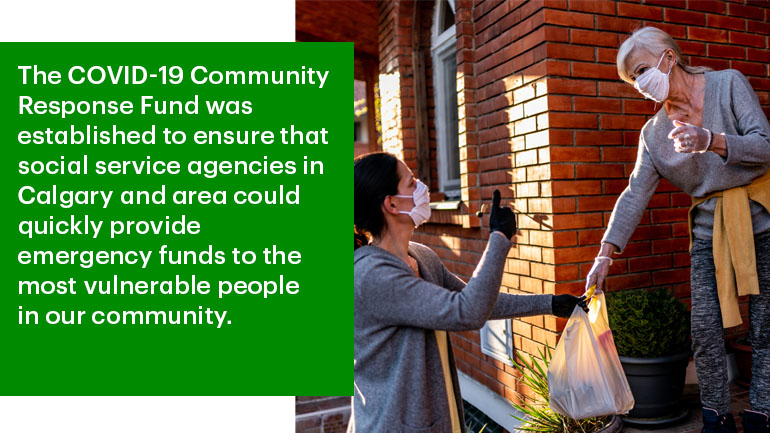Alec Clark, Head of Global Energy for TD Securities and Co-Chair of United Way of Calgary and Area's 2020 Campaign, discusses the economic and community impact COVID-19 has had on the prairie provinces, and the integral role local organizations play in the road to recovery ahead.
By Alec Clark
Head of Global Energy for TD Securities
TD Bank Group
This summer, provinces across Canada have begun the process of reopening their economies months after the onset of the COVID-19 pandemic. Quarantine measures are being eased, and people are slowly and safely returning to regular ways of life.
However, ongoing requirements for physical distancing and protective masks, as well as daily reminders of the number of active COVID-19 cases, continue to serve as stark reminders that there's a long way to go before Canada makes a full recovery.
Each province faces a unique journey back to economic prosperity. In particular, the prairie provinces of Alberta and Saskatchewan saw their economies walloped by the double impact of COVID-19 at the same time as they experienced a significant drop in oil prices.
The sudden and dramatic economic downturn has stricken communities in both provinces and tested our resilience. But it's hard times like these that shine a light on the local grassroots organizations that support our communities and provide us with an opportunity to truly help our neighbours.
COVID-19 and energy prices
Even before the pandemic, energy companies were feeling the pressure from low commodity prices due to a variety of market factors. But, as the world went into quarantine, people stopped driving and travelling—causing the entire crude oil complex to grind to a halt almost overnight—significantly reducing the demand for fuel and pushing prices down even further.
This was compounded by a dispute between OPEC+ members Russia and Saudi Arabia that flooded the market with an excess supply of oil. While the oil and natural gas sectors are predicted to slowly recover as the world emerges from COVID-19, the prices for these products continue to be volatile and remain low when compared to pre-pandemic levels.
Alberta is no stranger to the inherent volatility of the energy sector. This ebb and flow has long been a characteristic of a resource-based economy. However, the magnitude of the latest downturn is significant due to the combination of factors and the unprecedented impact of COVID-19.
To put it into perspective, Statistics Canada’s latest labour force survey estimated that at the end of May the unemployment rate in Alberta had surpassed 15%. This is the highest unemployment rate on record for the province since the start of the modern labour force survey in 1976.
In Calgary, corporate vacancies climbed to 27% in the most recent quarter from April to June, as entire office buildings now sit empty. The City of Calgary faces a 2020 budget shortfall somewhere between $145-million and $235-million. The City also temporarily laid off around 10% of its staff to help reduce expenses.
In a more symbolic hit, Calgary's best-known event, the Calgary Stampede, was cancelled for the first time in its 97-year history. In 2019, the much beloved 10-day festival celebrating western heritage contributed approximately $227-million to the city’s economy and $283-million to the Alberta economy.
Alberta has a history of resilience in the face of adversity, but the impact of COVID-19 and depressed energy prices have represented the perfect storm to hammer the economy unlike anything we've ever experienced.
Alberta's industry steps up to help
Early in the pandemic, energy companies were among the first to act and assist their communities. This was no surprise to many Calgarians, as the oil and natural gas industry has long shown its support by investing in the communities where they live and work. Many companies provided significant corporate donations, while others used their employee giving programs to match both donations and volunteering efforts.
Due to the nature of the oil and natural gas industry, some companies were also able to contribute unique materials to relief efforts. For example, oil companies had the ability to donate isopropyl alcohol, with one company donating 925,000 litres, enough to create roughly one million 12-ounce bottles of hand sanitizer.
Other unique donations from the sector have included things like homemade face shields, supplies of PPE, free food and drinks, essential items for hospitals, donation of temporary facilities, new computers for remote education, and assistance to nursing home and long-term care facilities.
While energy companies were busy contributing, it also became critical for organizations like United Way to help distribute the resources to those most in need. In the early days of the pandemic, the COVID-19 Community Response Fund, a collaboration between United Way of Calgary and Area and The City of Calgary (including the Calgary Emergency Management Agency), was established to ensure that social service agencies in Calgary and area could quickly provide emergency funds to the most vulnerable people in our community.
The fund supports vulnerable populations at greatest risk, including the elderly, Indigenous populations, those experiencing mental health and addiction issues, persons with disabilities, people experiencing homelessness, newcomers to Canada, and others that are impacted by the public health crisis and economic downturn. Over the past few months, energy companies have been among the biggest contributors to the Community Response Fund.
Working with United Way
When I was asked last fall to become the Co-Chair of United Way of Calgary and Area's 2020 Campaign, I had no idea how dramatically conditions would change for our province and our city.
As the Head of Global Energy for TD Securities, and being based in Calgary, I know the cyclical nature of the oil and natural gas industry all too well, but the magnitude of this latest downturn was a shock.
But despite the challenges and hardships we are seeing every day, I remain optimistic. It's been heartwarming to see the people of Alberta supporting their friends and neighbours. We're a resilient province that's used to overcoming adversity. We have a long history of weathering the dramatic downturns of the energy industry.
That's why it's not surprising to see Calgarians once again step up and showcase their generosity and support for their community. I'm also happy to say that TD joined energy companies in being an ally of United Way through corporate and employee donations. As a result of these combined efforts, the Community Response Fund has granted $10.3-million in early August to 197 local agencies in support of COVID-19 relief efforts.
But the need for relief isn't limited to Calgary, Alberta, or even the prairie region—it’s a national need across Canada. At this time, perhaps more than ever before, organizations like United Way need our backing. It's up to all of us to help our communities pull through these challenging times.
I know that you will answer the call, and that together, we will show our resilience and bounce back, stronger than ever.


